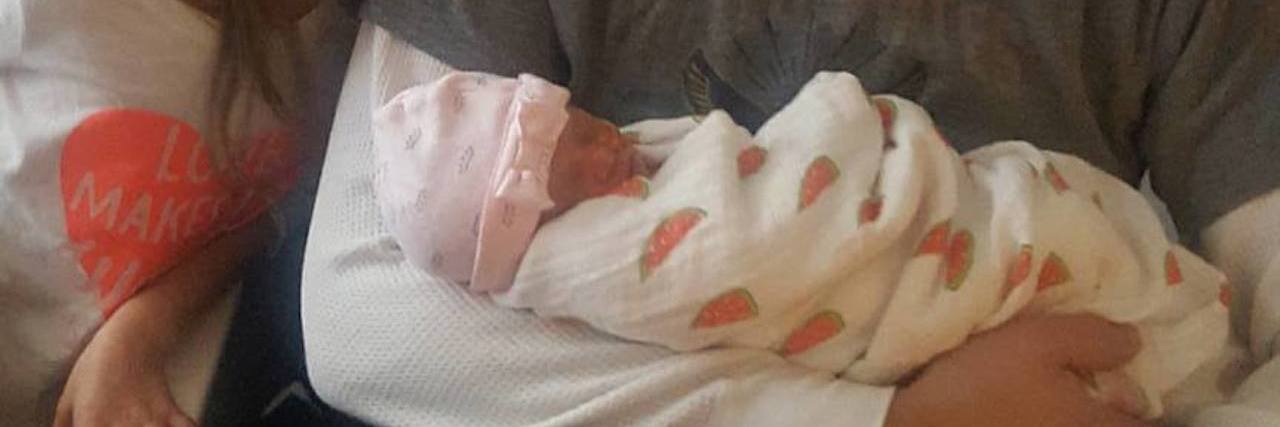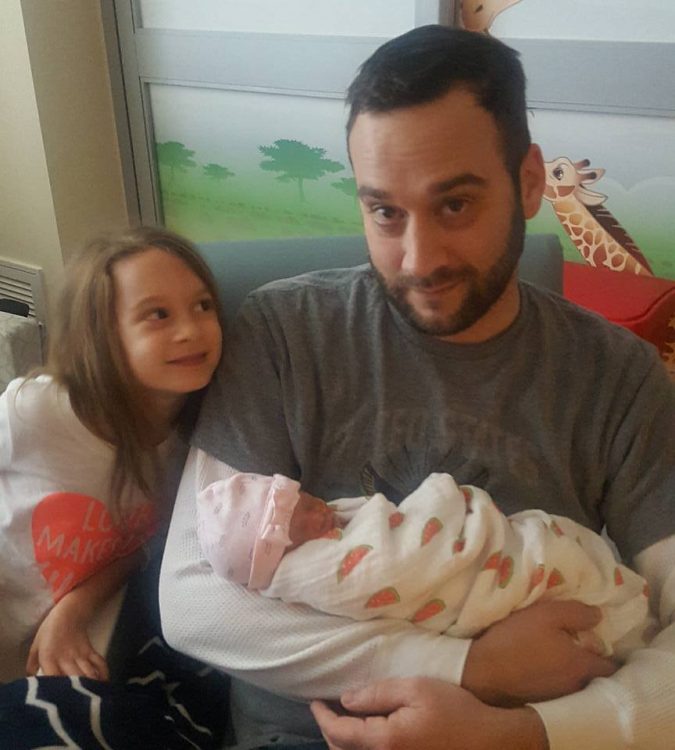Having a new baby is an all-around emotional process. Throw in a two-week stay in the NICU no one expected with a life-changing diagnosis, and you include a whole array of emotions that aren’t usually included in the package.
Anger and Frustration
Charlotte came in kicking and screaming at 4-pounds 13-ounces on a Saturday afternoon. I couldn’t have been happier. After delivery, I felt the same I did after our older daughter was born; relief that everyone is safe, pride in my new child, joy for my growing family, and the love for this child that just came into my life. This is when things started to be different. Soon came the constant stream of doctors telling us what was wrong with our baby — most notably her size.
We knew, due to a recent ultrasound, she would be around 5-pounds. That didn’t bother us or our OB at her office, but it sure seemed to bother a lot of people who worked at the hospital. Nurses told us the NICU would be notified, their on-duty neonatologist would come, and they “didn’t like small babies.” “Of course, she’s small,” I thought, “My wife and I both have a thin build, our other child was born just over 6-pounds, and she’s OK. These people don’t know what they’re talking about.”
But for the next several hours, it didn’t stop. They kept undressing Charlotte to take her vitals and constantly mentioned her dropping body temperature. The logic side of my brain kept saying, “Well, no kidding. That’s because you keep stripping my child down to nothing in this cold hospital. Of course she’s cold!” They kept telling us she was lethargic and weak. “Well, yeah, she’s a baby. Stop judging my kid!” Hearing all of the same things over and over but not really providing any real solutions or helping us understand the longevity and seriousness of what seemed simple problems, was actually provoking.
Doctors and nurses flooded into the room to tell us Charlotte needed to go into the NICU to “rest, stay warm and play catch up a little bit on her weight.” It all seemed so extreme for those simple symptoms. Then the big ones came. A neonatologist came in and said, ” I think she has Down syndrome. You need to get her tested.” It was as casual as I just wrote it. It may as well have been my mechanic suggesting I get my brake pads changed on my next visit. It was infuriating. To me, Charlotte was perfect. Looking back, I was being protective of my daughter. Which is healthy… to a point. But this was only the end of day two.
Fear and Uncertainty
I managed to calm down some the day after Charlotte got to the NICU. I saw the care the nurses gave to her, and it was obviously their calling in life. However, there was still underlying uncertainty. I knew she was safe, and it was where she needed to be, but I was so uneasy. I was scared there was something really wrong with her. “Will her body temperature ever regulate on its own?” “Maybe she has Leukemia.” “What’s going to happen between now and the time she leaves?” “Will she ever get to come home?” A week after she’d been brought to the NICU our new neonatologist, who we loved, showed us the symptoms and physical traits she saw and suggested the blood work to check for Down syndrome again. We agreed, reluctantly. While we waited the days for results, one of us was at the hospital around the clock, even overnight. Whomever wasn’t there was with our older daughter, Aubrie. We were exhausted. One day, my wife, Arielle, and I decided to get some lunch after we met with the doctor, and in all of this exhaustion, Arielle got overwhelmed. I stopped the car right there in the parking lot and we prayed together, asking for the results we needed to have, and the strength to accept them.
Depression and Disappointment
The “pre-diagnosis” felt like being in a hazy grey cloud. I was depressed. We were tired (an understatement) and ready for our kid to be home. I didn’t want this for Charlotte. I didn’t want this for my kid’s life. I wanted the healthy baby, a quick hospital stay and go home with pink balloons and flowers and a stuffed animal or two. I wanted her to do regular kid stuff.
I was being selfish. Selfish for the life I wanted for her. Then one day there was clarity. It was almost diagnosis day and we decided to go to the mall with Aubrie to spend some time with her. We grabbed some lunch at the food court. I took a quick look around and caught some people walking by. It was a dad with his two girls. The girls looked to be teenagers — one had Down syndrome. Her hair was done, she had a Star Wars T-Shirt on, a cool pair of Vans and some colorful socks (I wouldn’t understand the significance of the socks until later.) All three of them had a smile on their face. They were happy. And it seemed that we could all be happy like that one day, too. That family of strangers have no idea how much they helped me that day.
Relief, Hope, Pride and Joy
Charlotte was released from the hospital on a crisp Saturday in January. By then, my head had cleared up and I was hopeful for Charlotte’s future. I had come to accept that she probably had Down syndrome. I understood this was going to be our normal now, and that was OK.
The doctor gave us the news Charlotte did indeed have Down syndrome just a couple of hours before we left the hospital, exactly two weeks from her birth. The diagnosis was almost a relief. We now knew the root cause of what had kept her there for so long. Now we knew how to help her. Charlotte came home and had a string of follow-up appointments with her pediatrician, cardiologist, ophthalmologist, Ear, Nose and Throat, Physical and Speech therapy. Each one amazed at her overall health.
She is true to the meaning of her name, “Mighty Warrior.” I couldn’t be more proud of this little fighter. She brings joy to everyone she meets and is getting quite the little personality. Her smile makes my heart skip a beat; I can’t wait to see her awesomeness.
If I can offer some hope for other parents: it’s alright for negative emotions to creep in. It’s life-changing. Just don’t stay in them. Make sure you, your spouse and family are a team. Be there to support one another, and make sure you are communicating. Something like a Down syndrome diagnosis should change everything, without changing anything.
A version of this story originally appeared on The Lewis Pride.


